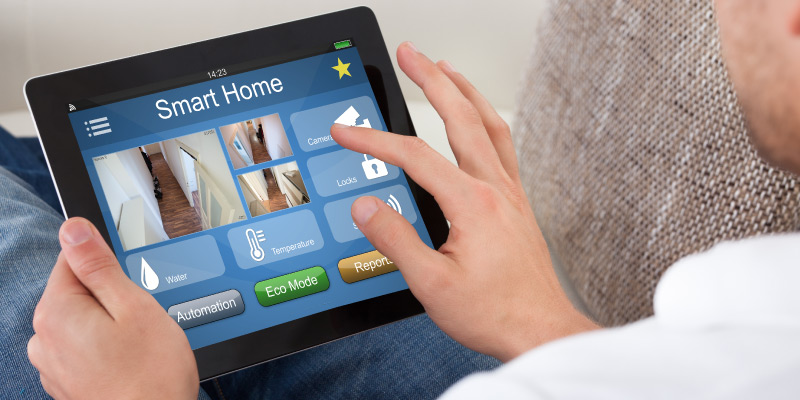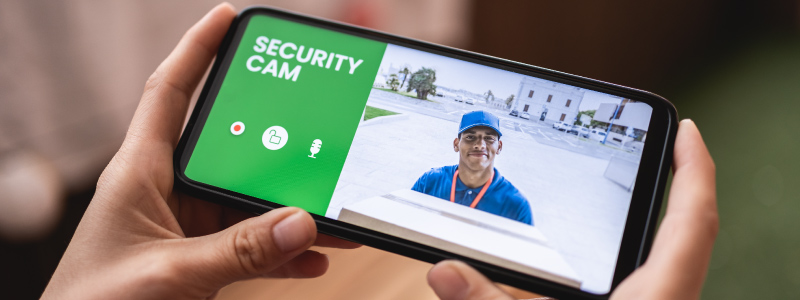Safeguarding your haven: Home security tips

Amanda Morgan

When it comes to home security, there are numerous strategies and devices that can significantly enhance the safety of your home. In the blog post, we'll be unpacking home security tips for a comprehensive guide on how to effectively secure your abode.
We'll take a deep dive into the utilization of smart home security devices, such as alarm systems, doorbell cameras, and smart locks. We will also explore access control strategies that can help deter potential burglars from choosing your house as a target.
In addition, we'll discuss establishing emergency protocols in case of suspicious activity or power outages. Finally, we'll cover optimizing device placement for maximum coverage and preparing for unexpected situations like power outages.
Secure your home with smart devices
In this digital age, smart home security devices are all the rage. They're easy to use and come with advanced features that make securing your home a breeze. Motion sensors, cameras, and smart door locks are just a few examples of what's available.
Motion sensors
Motion sensors are a crucial part of any home security setup. They detect movement in designated areas and send alerts if they sense something out of the ordinary. Some even come with temperature sensitivity features, which can be useful in detecting fires early on.
Security cameras
A good quality camera is another must-have device for a secure home environment. It allows homeowners to keep an eye on their residence anytime, anywhere with real-time video streaming to their smartphones or computers. Some security cameras even have night vision.
Smart door locks
Smart door locks are the future of home security. They allow you to lock and unlock doors remotely via an app on your phone or by using voice commands with compatible virtual assistants like Amazon Alexa or Google Assistant.
The best part? You no longer need physical keys that could get lost or stolen. Plus, most models let users create temporary access codes for guests - perfect for letting friends into your house while you're away.
For ultimate home safety and security, investing in smart home devices is a wise decision. They're practical, convenient, and offer peace of mind.

Create access-control strategies
In the world of home security, access control is crucial. It's all about managing who can enter your property and when. Providing a layer of protection, access control gives you the confidence that your home is safe and secure.
Use keyless entry systems
One popular form of access control is keyless entry systems like Vivint door locks. These devices allow you to set unique codes for different people - family members, friends, or service providers like cleaners or dog walkers. You can even set temporary codes for guests staying over.
Implement smart locks
Smart locks, which connect to your smartphone via an app, are another excellent option for controlling access to your home remotely. They offer features such as remote locking/unlocking and real-time alerts whenever someone unlocks the door.
Install security cameras with facial recognition
You could also consider installing security cameras equipped with facial recognition technology - they add an extra layer of protection by allowing only recognized faces into certain areas of your house.
Diversify your passwords
Passwords play a significant role in securing smart devices; therefore it's essential always to diversify them and change them regularly. Password generators can help create strong passwords that are difficult for others to guess while password managers store these complex passwords securely so you don't have to remember them all.
Educate family members about safety protocols
Last but not least, educate everyone in the household about safety protocols including how (and when) to use emergency services numbers, what each alarm signal means, and how they should respond accordingly. This will ensure everyone knows exactly what steps need taking during any given situation.
Establish emergency protocols
When a crisis arises, having an established emergency protocol can help protect those involved and limit any potential damage. Emergency protocols can help guide you and your family through difficult situations, ensuring everyone's safety and minimizing damage.
Start by identifying potential risks specific to your location and lifestyle. Then, ensure that everyone in your family or living with you is aware of the contact information to utilize in an emergency, whether it be calling for help or seeking assistance from nearby individuals. Lastly, have regular safety drills to ensure that emergency protocols become second nature. Practice makes perfect, so rehearse your plan to help everyone understand their roles better during real-life emergencies.
Tailoring protocols for different scenarios
- Burglary: Designate safe rooms within your home where everyone should gather if there's an intruder alert from your security system.
- Natural disasters: Depending on the type of disaster, identify the safest areas in your home or evacuation routes.
- Medical emergencies: Keep essential information handy, such as allergy details and medication lists, so they can be quickly shared with paramedics.
- Fires: Determine multiple escape routes from each room and designate a meeting spot outside away from danger.
Remember to regularly update your emergency protocols based on changes in circumstances or lessons learned from drills. Being prepared can make all the difference in an emergency.

Optimize device placement
For optimal home security, device placement must be considered carefully to identify any potential weak points. It's not enough to simply have the latest cameras or motion sensors; you need to position them strategically for maximum coverage and effectiveness.
The first step in optimizing your device placement is understanding what each component does and how it works. For instance, motion sensors work by detecting changes in infrared energy levels, so they should be placed where an intruder would likely pass through.
- Front and back doors: Install security cameras at all entry points of your house such as front door, back door etc., ideally at a height which can't be easily tampered with but provides a clear view of anyone approaching.
- Main hallways: Motion detectors are best installed in main hallways or corridors leading up to bedrooms or other important rooms.
- Near valuables: If you have specific valuables like artwork or expensive electronics, consider placing additional devices near these items for added protection.
In addition to strategic positioning based on function, also consider environmental factors that could affect performance. Avoid installing devices where they might be obstructed by furniture or decorations. Also avoid areas prone to extreme temperatures or humidity which may damage the equipment over time.
Remember, a well-placed camera can provide a wide field of vision covering multiple potential access points while minimizing blind spots. Similarly, a properly positioned motion sensor can detect movement across large areas without being triggered by pets or other non-threats.
Balancing coverage with privacy
Last but not least: remember privacy considerations when planning device locations. While it's essential that your home is secure against external threats, don't forget about internal comfort too. Make sure any surveillance doesn't invade personal spaces like bathrooms and bedrooms unless absolutely necessary due to unique circumstances.
Prepare for power outages
Don't let a power outage compromise your home security system. Follow these tips to ensure your devices remain operational:
Invest in battery backup systems
Make sure your security devices have battery backup systems to keep them running during short-term blackouts. Some advanced home security systems come with built-in battery backups, while others may require separate purchases.
Opt for solar-powered devices
Consider using solar-powered security cameras and sensors that draw energy from sunlight and store it for later use. This is especially useful during extended periods without electricity.
Use Uninterruptible Power Supply (UPS)
For wired equipment like alarms or surveillance cameras that need continuous operation, use an uninterruptible power supply (UPS) that provides emergency power to a load when the input source fails.
Do daily device checkups
Ensure all your measures are working correctly by conducting daily device check-ups, especially before severe weather events where chances of blackout increase.
Remember, a well-prepared homeowner is always ready for any situation, including unexpected power outages.
Keep your home safe
Investing in a good home security company is the best decision you'll make for your home. It not only ensures that your valuables are safe but, most importantly, that you and your family are. We at HomeLinkd work with two of the best home security companies, ADT and Vivint, in the States to bring you tight home security and peace of mind always.










